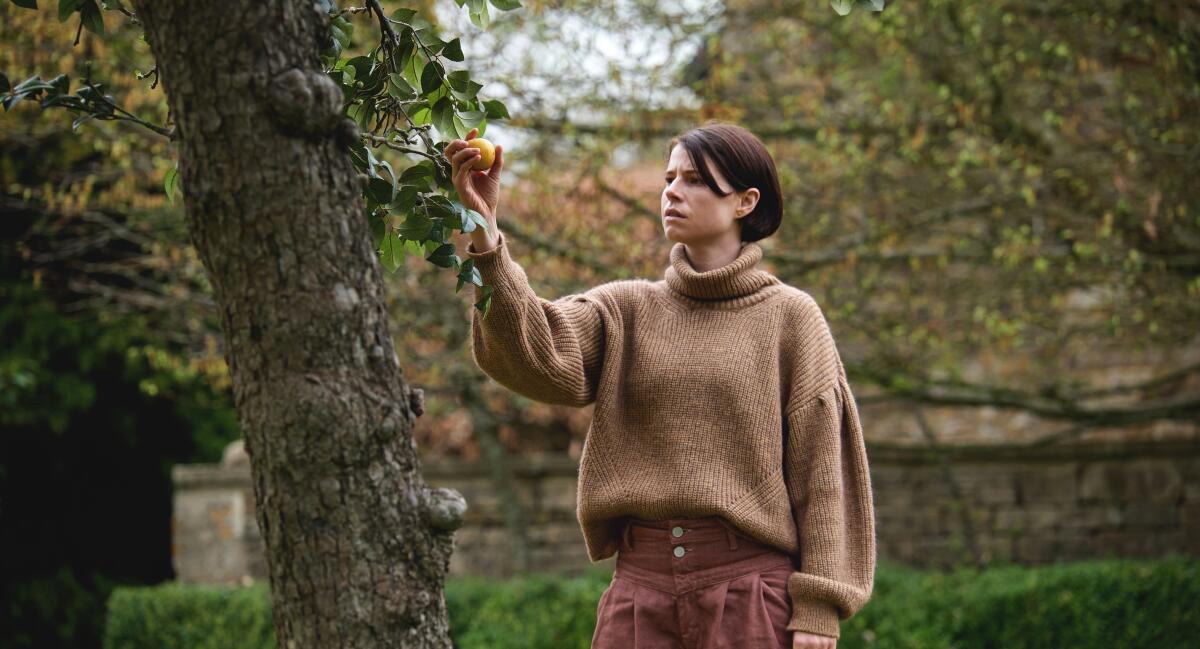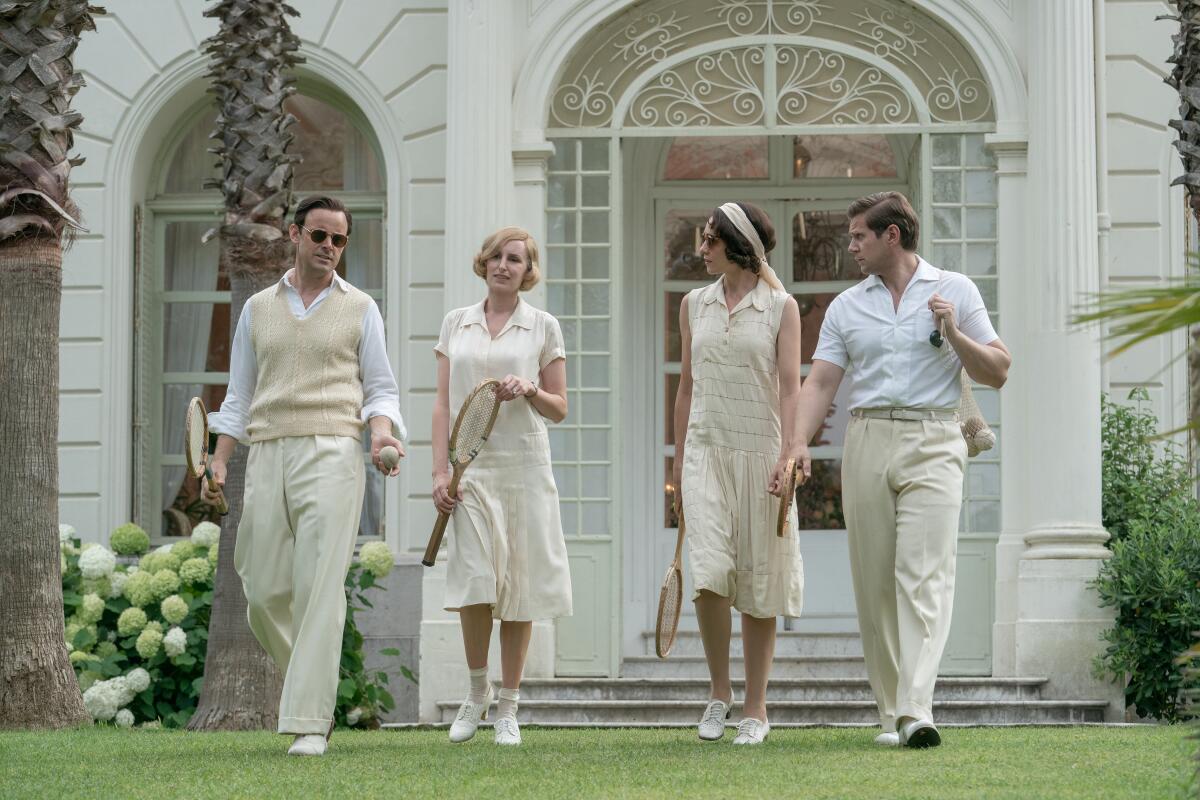Jessie Buckley confronts misogyny in ‘Men’

- Share via
Hello! I’m Mark Olsen. Welcome to another edition of your regular field guide to a world of Only Good Movies.
Only good movies
Get the Indie Focus newsletter, Mark Olsen's weekly guide to the world of cinema.
You may occasionally receive promotional content from the Los Angeles Times.
I want to begin this week’s newsletter by giving a big thank you to my colleague Sonaiya Kelley, who handled things the past few weeks while I took a much-needed vacation. It was such a delight for me to be able to read the newsletter with the same sense of joy and discovery I hope I am able to bring to all of you each week.
The Landmark Pico is closing. While I was away, Landmark Theatres announced they’d be shutting down their location on Pico Boulevard in Los Angeles at the end of the month after failing to reach terms with their landlord. This is a huge blow to art house releases locally, just when it seemed that theatergoing had been getting back on track. It is shocking to think that the two locations where, before the pandemic, many platform releases would begin their national run — the ArcLight in Hollywood and the Landmark on Pico — will soon both be shuttered.
Cannes is underway. Part of the reason the closure is so concerning is that there will continue to be plenty of movies we’ll all want to see playing in theaters. Justin Chang is at the Cannes Film Festival getting a first look at countless upcoming films. His festival preview tipped new titles from filmmakers such as Claire Denis, Hirokazu Kore-eda, Arnaud Desplechin, David Cronenberg, Park Chan-wook, Mia Hansen-Løve and more.
In his first dispatch from the fest, Justin wrote about James Gray’s “Armageddon Time,” a personal story about growing up in 1980s New York City starring Anne Hathaway, Jeremy Strong and Anthony Hopkins. As Justin wrote, “The distance and specificity of the movie’s 1980 setting serve as a reminder, troubling as well as reassuring, that every era has its false doomsday prophets, and every generation imagines it might be humanity’s last. It’s not the only way in which history resonates anew in ‘Armageddon Time,’ a coming-of-age drama that feels both tenderly observed and acutely, rigorously pessimistic about its moment, as well as ours.”
Preservation treasures on display. The UCLA Film & Television Archive’s Festival of Preservation, one of the true treasures of the L.A. exhibition scene, starts today, and this year all tickets are free. As Kenneth Turan wrote in his overview, “Time and again, no movie event in Los Angeles has excited me more than this one, and this latest iteration is no exception. … The festival not only showcases the restoration of classic films to pristine condition, it delights in shining a light on hidden gems and unexpected corners of the cinematic universe, items you had no idea existed, let alone expected to ever see on a big screen.”
Things kick off tonight with the world premiere of the restorations of William Dieterle’s 1941 gothic fantasy, “All That Money Can Buy,” along with Alfred E. Green’s 1949 Christmastime noir, “Cover Up.”
Enjoying this newsletter? Consider subscribing to the Los Angeles Times
Your support helps us deliver the news that matters most. Become a subscriber.
‘Men’
Written and directed by Alex Garland, whose previous films as director are “Ex Machina” and “Annihilation,” “Men” is a terrifying folk-horror fable that demands to be mulled over and considered, providing no easy answers. A woman named Harper (Jessie Buckley) goes to a remote country house to grieve the death of her husband, James (Paapa Essiedu). Every man she meets — the owner of the house, local police, a clergyman, the naked figure stalking the yard — is played by actor Rory Kinnear, immediately pushing the story into the realm of the unnerving and supernatural, and it only gets weirder and wilder from there. The film is playing now in theaters.
For The Times, Justin Chang wrote, “Garland draws on standard thriller conventions and concepts — a stalker scenario, a slasher set-piece, a body-horror climax — but nothing about what he’s trying to say is easy to pinpoint or summarize. … But as with ‘Annihilation’ before it, the more surreal ‘Men’ gets, the less frightening and more melancholy it becomes; it’s as if the movie were peeling back the skin of its chosen subject to reveal the diseased, writhing and frankly pitiable mess underneath. And Garland, like a coroner performing an autopsy, surveys his specimen with clinical rigor, gallows humor and the faintest hint of sorrow. Men are the worst. But ‘Men’ is still something to see.”
Josh Rottenberg spoke to Garland, Kinnear and Buckley, who all addressed how the movie was designed to raise questions and stoke unease and uncertainty. “I’m sure there will be a range of opinions and a range of responses to the film,” Garland said. “I see a group of people who make a film as, in some small way, being participants in a conversation. The film is just a space to turn things over in one’s head. What is front and center is not what you’re thinking about but what you’re feeling.”
For the New York Times, A.O. Scott wrote, “Garland has shown himself to be adept at intellectual genre play, embedding heady ideas about power, desire, technology and violence in tales that lean toward science fiction and horror. In ‘Men,’ he skillfully manipulates moods and subverts expectations without achieving the unsettling, hallucinatory clarity of his best films. It also lacks the intellectual coherence of other recent exercises in allegorical cinematic provocation — movies like Charlie Kaufman’s ‘Anomalisa,’ Lars von Trier’s ‘Antichrist,’ Yorgos Lanthimos’s ‘The Lobster’ and Jordan Peele’s ‘Get Out.’ There isn’t really an argument here, and what looks like feminism is more like mansplaining.”
For Vulture, Angelica Jade Bastién wrote, “Despite all the broken bones, the graphic deaths, and the copious amounts of blood, the driving idea behind ‘Men’ is not bold enough to feel frightening. Instead, it’s remarkably tepid. Garland renders misogyny airless, reduced to a primal issue rather than one that is man-made. Prejudice is framed as a constant, forever replicating itself in new guises; the film’s characters read as threadbare ideas rather than people. In many ways, ‘Men’ rests on an understanding of modern ‘prestige’ horror preferred by production company A24: It should be more than grotesqueries — it should have a message, often bluntly communicated. The message behind ‘Men’ amounts to ‘Damn, misogyny is crazy, right?’”

‘Emergency’
Directed by Carey Williams from a screenplay by K.D. Dávila, “Emergency” premiered earlier this year at the Sundance Film Festival. Kunle (Donald Elise Watkins) and Sean (RJ Cyler) are Black students at a mostly white college. Excited for a night of spring break partying, their plans are interrupted when they find a white girl they do not know, Emma (Maddie Nichols), somehow passed out on their living room floor. Along with their roommate Carlos (Sebastian Chacon), they must decide how to deal with the situation in an escalating comedy of miscalculations. The film is in theaters now and begins streaming May 27 on Prime Video.
For the Washington Post, Ann Hornaday wrote, “‘Emergency’ possesses an extraordinarily light touch, with Williams moving the action along at a satisfying trot and Dávila’s dialogue never feeling preachy or put-on. The entire milieu feels lived in and of the moment, as well-meaning young people parse cultural sensitivities and their own occasionally contradictory desires. … In this wryly perceptive slice of only slightly exaggerated life, no good deed goes unpunished — or potentially distorted through the lens of bias, self-protection, tribal loyalties or trauma. Comedy is best when it occupies that high wire where humor and pain engage in a perilously delicate dance. ‘Emergency’ knows that they exist side by side — and with that in mind, it sticks a perfect landing.”
For Deadline, Valerie Complex wrote, “The movie makes it difficult to become engrossed in its social commentary without feeling it’s making a mockery of its message. Maybe that’s the point? The film is all over the place, and the payoff doesn’t hit you in the feels as it should. … Who is ‘Emergency’ for? Who is the target demographic for this? These types of films can be grating because they try to tackle so many issues at once instead of perfecting one concept and building a world around that. There is some magic here, but the misplaced laughs and the hallow characters make it arduous to connect with the film on any level.”
For the Playlist, Robert Daniels wrote, “This film is about Black men, how white folks see them, and the myriad of ways Black men must take seemingly incomprehensible actions to avoid incomprehensible ends. In its scope, there are, however, casualties along the way. Their stoner Latinx roommate, Carlos (Sebastian Chacon), treated as an outsider, isn’t well-sketched. That’s partly to do with how Kunle and Sean aren’t able to see him. But it is no less unsatisfying, in a film so specific with respect to how the world observes people of color. … It’s the unbreakable friendship between Kunle and Sean, the ways their time together, good or bad in college, will mark how they see the world, and how the world sees them, forever, that makes Williams’ ‘Emergency’ an elaborate, chaotically hilarious, intensely terrifying journey worth taking.”

‘Downton Abbey: A New Era’
Directed by Simon Curtis from a screenplay by Julian Fellowes, “Downton Abbey: A New Era” continues the adventures of the long-running franchise, which has successfully jumped from television to movies. Regular players Maggie Smith, Hugh Bonneville, Elizabeth McGovern, Michelle Dockery and others are joined by newcomers including Hugh Dancy and Dominic West in a tale that finds the halls of Downton Abbey taken over by a film production as others depart for a villa in France. The film is in theaters now.
For The Times, Justin Chang wrote, “Yes, even the end comes with giggles and reassurances at Downton Abbey, a place so overstuffed with cushions and tapestries that soft landings are all but guaranteed. That was more or less the point of the original Julian Fellowes-created series, which opened on a chaotic moment in 1912, when it appeared that the Crawleys’ gleaming world of aristocratic pleasure and privilege might soon be endangered. … Next to both ‘Gosford Park’ and the ‘Downton Abbey’ series, the two ‘Downton’ movies feel both graceless and superfluous, partly because they’re structured — seemingly by necessity, though more out of laziness — around some Very Special Surprise Guests who conveniently throw the entire household into disarray.”
Emily Zemler spoke to Dockery, who talked about returning again to the role that made her a star. “It’s rare to go back to what feels like a regular job,” Dockery said. “It’s quite rare in an actor’s life. I love the familiarity of it, because when you start a new job, there’s a certain amount of nerves and trepidation leading up to it. And preparation and various things you have to do to get into character. Whereas with Lady Mary, I just put on the shoes and one of the dresses in the fitting, and there she is. It’s such an easy job, really, and to be surrounded by the people that you love and have known for 12 years is a real privilege.”
For the New York Times, Amy Nicholson wrote, “The stately series that began its story with the sinking of the Titanic in 1912 has now arrived at the tail end of the 1920s. The choppy waters of modernity are materializing on the horizon. To stay afloat, this amiable sequel decides to ever so slightly democratize itself: The upstairs-downstairs division that has long separated the estate’s masters from their servants begins to leak. … Yet, Fellowes manages to navigate ‘Downton Abbey’ to charm both reactionaries and revolutionaries, finagling a sequence that allows the staff to usurp the formal dining room while the rich serve themselves at a buffet. The inversion gently rocks the boat, with no threat of tipping it over.”
For Vanity Fair, Richard Lawson wrote, “We really shouldn’t like ‘Downton’ at this point, for plenty of valid reasons: the unnervingly rosy picture that creator Julian Fellowes (who also wrote this new film) has drawn of class differences in early 20th century England; the franchise’s almost perverse primness, its tidy, bustling, polite affect so lustily rendered by Fellowes and his cast. ‘Downton Abbey’ is downright unseemly, especially now that it’s taken to lurking in alleys, peddling its potent narcotic to only the most helplessly addicted—a sinister act of hardcore fan service. But as Meryl Streep famously said on the Oscar stage while winning best actress for playing Margaret Thatcher, whatever. I still like ‘Downton Abbey,’ as do many people the world over. It’s a cozy comfort to return to this airy, nearly consequence-free world.”

Only good movies
Get the Indie Focus newsletter, Mark Olsen's weekly guide to the world of cinema.
You may occasionally receive promotional content from the Los Angeles Times.




